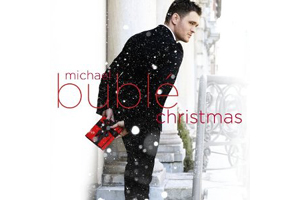“It’s Beginning to Look a Lot Like Christmas,” and sound like it too after this first track on Michael Bublé’s “Christmas” album released on Oct. 24. With his first song, Bublé keeps it classic with his rendition that has an almost identical tempo to Bing Crosby’s traditional version.
In “Santa Claus is Coming to Town,” Bublé’s smooth voice is a bit subdued compared to the Jackson 5 version, giving the disco-pop song a jazzy spin. Bublé’s silky vocals and the flawless orchestra complement one another , placing the focus of the song on the music rather than the lyrics. The instrumentals create an upbeat song, turning a holiday party background song into a tune perfect for dancing.
The festivities continue as Buble pairs with the Puppini Sisters to create an animated version of “Jingle Bells” that’s as lovely as it is lively. The quick tempo of this song set by the always impeccable orchestra is followed equally impeccably by Bublé and the Puppini Sisters. The Puppini Sisters’ accompaniment fits in nicely, harmonizing with Bublé, despite the number of female vocals outnumbering his sole male voice.
The doo-wop version of “White Christmas” falls short of Bing Crosby’s beautiful, iconic song. Still, the ill-fitting background vocals are made up for by Bublé’s surprising partnership with Shania Twain. This track is quite an eccentric mix of genres, from blues to country to jazz, and the upbeat instrumentals and harmonized vocals make the song worth a listen.
Next on the album is “All I Want for Christmas is You,” but Bublé’s mellow take on Mariah Carey’s hit leaves something to be desired. For once, a pop song outshines a jazz melody. Many have tried and failed to hit the high notes in Carey’s infectious, dance-inducing song, while Bublé’s sweet lullaby is more sleep-inducing.
Bublé keeps it classic with “Holly Jolly Christmas,” revamping this otherwise traditional version with electric guitar, accompanied by the sound of sleigh bells and a slow drum beat.
The only true failure on the album is “Santa Baby,” a song that is traditionally sung by a woman, and for a reason. The seductive nature of the song is playful when Madonna sings it, but creepy when Bublé tries to replace ‘Santa baby’ with ‘Santa buddy.’ The replacement of Tiffany’s with Mercedes and a ring for ‘cha-ching’ makes the gender reversal painfully obvious.
He compensates for attempting to seduce Santa with his melodic recreation of “Have Yourself a Merry Little Christmas.” While it would honestly be difficult to mess up such an elegant song, his voice truly does this sentimental ballad justice.
Bublé also redeems himself with his second Mariah Carey remake, “Christmas (Baby Please Come Home).” This version is just as upbeat, but made even better by Bublé’s powerful voice that far surpasses Carey’s sometimes pitchy voice.
Quiet guitar strums paired with Buble’s solemn voice slow things down in “Silent Night.” In the second verse, his vocals are replaced with those of a children’s choir in keeping with the childlike simplicity of this sacred song.
The jazz band returns in “Blue Christmas,” a song that is typically even more depressing than the title warrants. “Blue Christmas” is Bublé’s best remake as he makes the song his own, his almost seductive version not even resembling the miserable original.
The only original tune, “Cold December Night,” is an adequate song, but altogether unmemorable with its predictable lyrics about mistletoe and stockings.
“I’ll Be Home for Christmas” is appropriately poignant with its lonely lyrics about yearning to spend Christmas with loved ones. This song highlights the elasticity of Buble’s voice as he can transition between jazz dance numbers and bittersweet ballads.
The holy nature of the holiday is represented in the musical prayer “Ave Maria,” which is kept sacred with Bublé’s opera-like tone.
Lastly, he closes the album with his duet with Latin music star Thalia in “Mis Deseos/Feliz Navidad” with a tempo too slow for a song with Spanish flair. Still, the remarkable orchestra’s accompaniment of the chorus creates a unique Christmas tune.
Throughout the entire album, the always impressive orchestra complement’s Bublé’s smooth, old-fashioned voice to spruce up Christmas classics.
Cara Reilly is Copy Chief for the JCpatriot and JCpatriot.com



